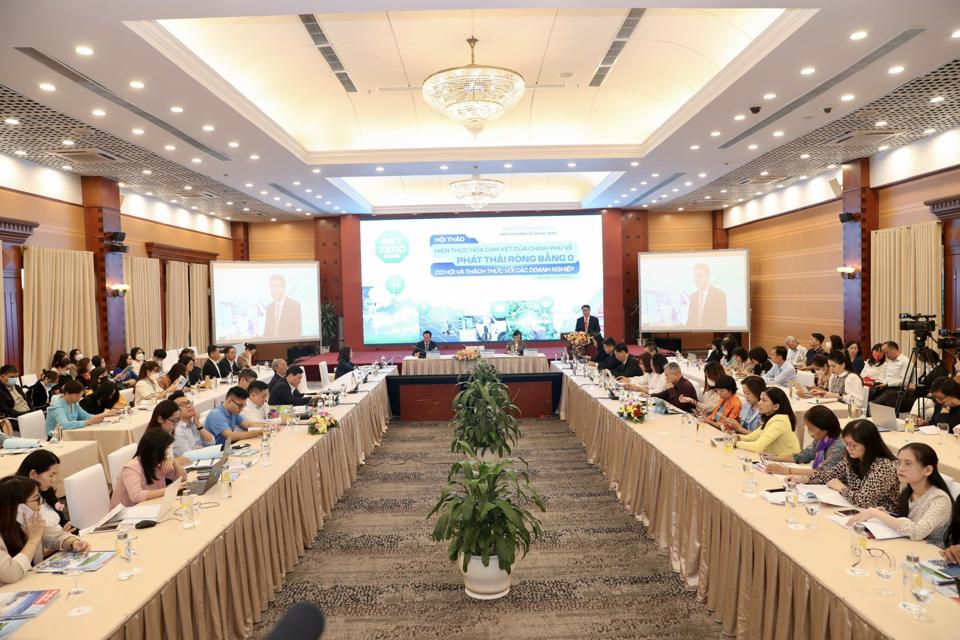Carbon market requires proper development: Experts
Officials have urged the Government to hasten the development of the carbon market to meet international rules and practices.
Vietnam needs a proper carbon market to reach net-zero emissions as committed to the global community, Nguyen The Chinh, former Director of the Institute of Strategy and Policy on Natural Resources and Environment, said on October 11.
| Attendees at the workshop on net zero emission held in Hanoi. Photo: Khac Kien |
According to the Organization for Economic Cooperation and Development (OCED), the carbon market is "a trading system through which countries may buy or sell units of greenhouse-gas emissions to meet their national limits on emissions, either under the Kyoto Protocol or under other agreements."
"The term comes from the fact that carbon dioxide is the predominant greenhouse gas, and other gases are measured in units called "carbon-dioxide equivalents," OCED said on its website.
Chinh said a carbon market is built on a pure relationship between supply and demand with a win-win principle.
Under Decree 06/2022/ND-CP dated January 7, 2022, by the Government, Vietnam has to complete the development of the carbon market and pilot it in 2025. The country needs to fulfill all requirements and put the market into official operation from 2028 onwards.
"The Government and business community have to accomplish five tasks to create a complete carbon market."
The Ministry of Finance is tasked with drafting a regulation on the development of the carbon market and submitting it to the Prime Minister for approval to launch the market in 2025, he said.
Chinh said that local companies should calculate the volume of greenhouse gas emissions from their production.
"Carbon credit traders should study the market with development potential, resources and infrastructure."
In addition, the development of the carbon market needs the participation of all stakeholders, including enterprises, business associations, entrepreneurs, and government agencies, he said.
"The likes of the Vietnam Chamber of Commerce and Industry (VCCI) should assist local companies in raising awareness of the carbon market," the official said.
He added that communication needs to be improved so that companies know how the carbon market works, which will help the market function properly in Vietnam.
Last but not least, the support of the Government and local authorities in developing policies, infrastructures and administrations will best facilitate businesses in the carbon market, he said.
Local businesses also need to study international regulations and practices on the carbon market to be well prepared when the market is launched, according to Do Thi Thu Huong, a representative of the Private Economy Development Board under the Prime Minister's Administrative Reforms Council.
A recent study of 400 companies by the board shows that 80% of the firms have little knowledge of greenhouse gas reduction. Meanwhile, 41% of the surveyed companies are clueless about at least one of the items related to the issue, Huong said.
The official urged local companies to improve their knowledge about the reduction of emissions and the commitments of the Government assumed in the Global Conference on Climate Change (COP26).
"Government agencies should assist local companies in raising their awareness and speeding up the drafting of the carbon market regulations."
Vietnam is one of the biggest emitters in ASEAN, and the Government has pledged to change the situation, however, challenges have remained, she said.
The challenges lie in the openness of the Vietnamese economy, which depends much on exports, Huong said.
"Vietnamese exports to the U.S. market in 2021 amounted to $96.3 billion and those to the EU to $45.8 billion. Local businesses would face some hurdles as they must meet requirements set by the authorities of those markets."
Pham Thi Thanh Tung, Deputy Director of the Credit Department under the State Bank of Vietnam, said that green bonds could be essential to assist local companies.
In 2017-2020, the total balance of green credits increased by an average of 25% per annum. As of June 30, 2022, the entire balance of green credits was VND474 trillion, accounting for 4.1% of the country's total credit. The figure was up 7.08% on-year, and most credits focused on clean energy (47%) and green agriculture (32%).
Challenges remain, as Vietnam does not have clear regulations on green credits, Tung said, adding that certification of green credits for development projects requires technical criteria, which banking professionals have yet to obtain.
She added that administration risks due to the lack of standards for assessing environmental impacts.












